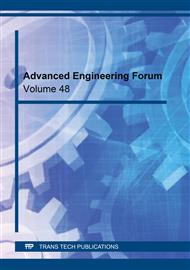[1]
F. Okeke, C. Sam-amobi and F. Okeke, Role of local town planning authorities in building collapse in Nigeria: evidence from Enugu metropolis, Heliyon. 6 (2020) e04361.
DOI: 10.1016/j.heliyon.2020.e04361
Google Scholar
[2]
I. Obianyo, G. Ihekweme, A. Mahamat, K. Onyelowe, A. Onwualu and A. Soboyejo, Overcoming the obstacles to sustainable housing and urban development in Nigeria: The role of research and innovation, Cleaner Engineering and Technology. 4 (2021) 100226.
DOI: 10.1016/j.clet.2021.100226
Google Scholar
[3]
B. Olusola and O. Akintayo, An assessment of failure of building components in Nigeria, Journal of Building Appraisal. 4 (2009) 279-286.
DOI: 10.1057/jba.2009.6
Google Scholar
[4]
B. Kulmedov, A. Dayyabu, S. Abdulganiyu and A. Hassan, Analysis of the Mechanical Conformity of the Reinforcement Steels Used in Nigerian Market to the Standards, Journal of Mechanical Engineering Research and Developments. 44 (2021) pp.28-36.
Google Scholar
[5]
J. Odusote, W. Shittu, A. Adeleke, P. Ikubanni and O. Adeyemo, Chemical and Mechanical Properties of Reinforcing Steel Bars from Local Steel Plants, Journal of Failure Analysis and Prevention. 19 (2019), 1067-1076.
DOI: 10.1007/s11668-019-00695-x
Google Scholar
[6]
A. Adeleke et al., Dataset on the evaluation of chemical and mechanical properties of steel rods from local steel plants and collapsed building sites, Data in Brief. 21(2018) 1552-1557.
DOI: 10.1016/j.dib.2018.10.162
Google Scholar
[7]
O. Joshua, K. Olusola, C. Ayegba and A. Yusuf, Assessment of the Quality Steel Reinforcement Bars Available in Nigerian Market, AEI 2013: Building Solutions for Architectural Engineering. (2013) 296 – 305.
DOI: 10.1061/9780784412909.029
Google Scholar
[8]
G. Bamigboye, O. Olaniyi, D. Olukanni, A. Ede and I. Akinwumi, Diameter Inconsistency, Strength and Corrosion Characteristics of Locally-Produced and Imported Steel Reinforcing Bars in Ilorin, Nigeria, International Journal of Engineering Research in Africa. 29 (2017) 90-97.
DOI: 10.4028/www.scientific.net/jera.29.90
Google Scholar
[9]
A. Adeleke and J. Odusote, Evaluation of the Mechanical Properties of Reinforcing Steel Bars from Collapsed Building Sites, Journal of Failure Analysis and Prevention. 13 (2013) 737-743.
DOI: 10.1007/s11668-013-9739-5
Google Scholar
[10]
O. Ocheri and L. Ibe, Comparative Assessment of Locally Produced Reinforcing Steel Bars for Structural Purposes: 12 mm Steel Bars from Delta Steel Company (DSC), Warri-Nigeria as a Case Study, Journal of Powder Metallurgy & Mining. 6 (2017) 1-4.
DOI: 10.4172/2168-9806.1000159
Google Scholar
[11]
S. Haruna, A. Farouk and A. Gora, Comparative Analysis of Commercially Available Reinforced Steel Bars in Kano-Nigeria (Case Study: Kofar Ruwa Market), Journal of Civil and Construction Engineering. 6 (2020) 36-40.
Google Scholar
[12]
Y. Shuaib-Babata et al., Quality Evaluation of Commercially Available Steels in Some Selected Nigerian Markets, International Journal of Engineering. 2 (2019) 103-114.
Google Scholar
[13]
W. Ajagbe, A. Ganiyu, A. Adegbite and O. Akodu, Investigations on the chemical composition and tensile strength of steel bars in the Nigerian construction industry, IOP Conference Series: Materials Science and Engineering. 513 (2019) 1-9.
DOI: 10.1088/1757-899x/513/1/012026
Google Scholar
[14]
T. Abioye and O. Billihaminu, Investigation into the Strength Characteristics of Reinforcement Steel Rods in Sokoto Market, Sokoto State Nigeria, International Journal of Latest Research in Engineering and Technology (IJLRET). 2 (2016) 66-69.
Google Scholar
[15]
H. Ozioko, Experimental Investigation of Yield Strengths of Nigerian Manufactured Steel Reinforcing Bars, Umudike Journal of Engineering and Technology (UJET). 2 (2022) 19-24 (2022).
Google Scholar
[16]
T. Nwakonobi and S. Umar, Comparative Study on the Strength Characteristics of Reinforcement Bars from Local Industries and Imported Sources, International Journal of Scientific & Engineering Research. 6 (2015) 1011-1015.
Google Scholar
[17]
A. Ede, E. Egunjobi, G. Bamigboye and J. Ogundeji, Assessment of Quality of Steel Reinforcing Bars Used in Lagos, Nigeria, International Research Journal of Innovative Engineering. 1 (2015) 1-8.
Google Scholar
[18]
A. Ede, O. Olofinnade and O. Joshua, Experimental Investigation of Yield Strengths of Steel Reinforcing Bars Used in Nigerian Concrete Structures, International Journal of Scientific & Engineering Research. 5 (2014) 76-83.
Google Scholar
[19]
A. Awofadeju, A. Adekiigbe, A. Akanni and B. Adeyemo, Evaluation of Locally Produced and Imported Reinforced Steel Rods for Structural Purposes in Nigerian Market, International Journal of Recent Development in Engineering and Technology. 3 (2014) 81-84.
Google Scholar
[20]
A. Joseph, Assessment Of Mechanical Properties Of Reinforcing Steel Used In Construction Works At F.C.T, Abuja, International Journal of Engineering Research & Technology (IJERT). 2 (2013) 2346-2358.
Google Scholar
[21]
S. Ejeh and M. Jibrin, Tensile Tests on Reinforcing Steel Bars in the Nigerian Construction Industry, IOSR Journal of Mechanical and Civil Engineering (IOSR-JMCE). 4 (2012) 6-12.
DOI: 10.9790/1684-0420612
Google Scholar
[22]
A. Alabi and L. Onyeji, Analysis and Comparative Assessment of Locally Produced Reinforcing Steel Bars for Structural Purposes, Journal of Research Information in Civil Engineering. 7 (2010) 49-60.
Google Scholar
[23]
D. Seward, Understanding Structures: Analysis, Materials, Design, fifth ed., Palgrave Macmillan Suffolk, (2014).
Google Scholar
[24]
C. Nwoji and A. Ugwu, Comparative Study of BS 8110 and Eurocode 2 in Structural Design and Analysis, Nigerian Journal of Technology (NIJOTECH). 36 (2017) 758 – 766.
DOI: 10.4314/njt.v36i3.14
Google Scholar
[25]
British Standards Institution (BSI), Steel for the reinforcement of concrete – Weldable reinforcing steel – Bar, coil and decoiled product – Specification, BS 4449:2005, BSI, London, (2005).
DOI: 10.3403/30109892
Google Scholar
[26]
British Standards Institution (BSI), Eurocode 2: Design of concrete structures – Part 1-1: General rules and rules for buildings, BS EN 1992-1-1:2004+A1:2014, BSI, London, (2014).
Google Scholar
[27]
Standard Organization of Nigeria (SON) Nigeria Industrial Standard Specification for Steel Bars For Reinforcement of Concrete, NIS 177:2004, SON, Abuja, (2004).
Google Scholar


